Key takeaways:
- Progressive rock is characterized by complex compositions, lyrical depth, and concept albums that invite deep emotional and introspective experiences.
- Influential bands like Yes, Genesis, King Crimson, and Pink Floyd have significantly shaped the genre, each contributing unique artistic elements.
- Instruments, especially synthesizers and guitars, play a crucial role in defining the distinct sound of progressive rock, enhancing emotional connections during performances.
- Live performances often combine musical intricacy with visual artistry, creating immersive experiences that leave lasting impressions on audiences.
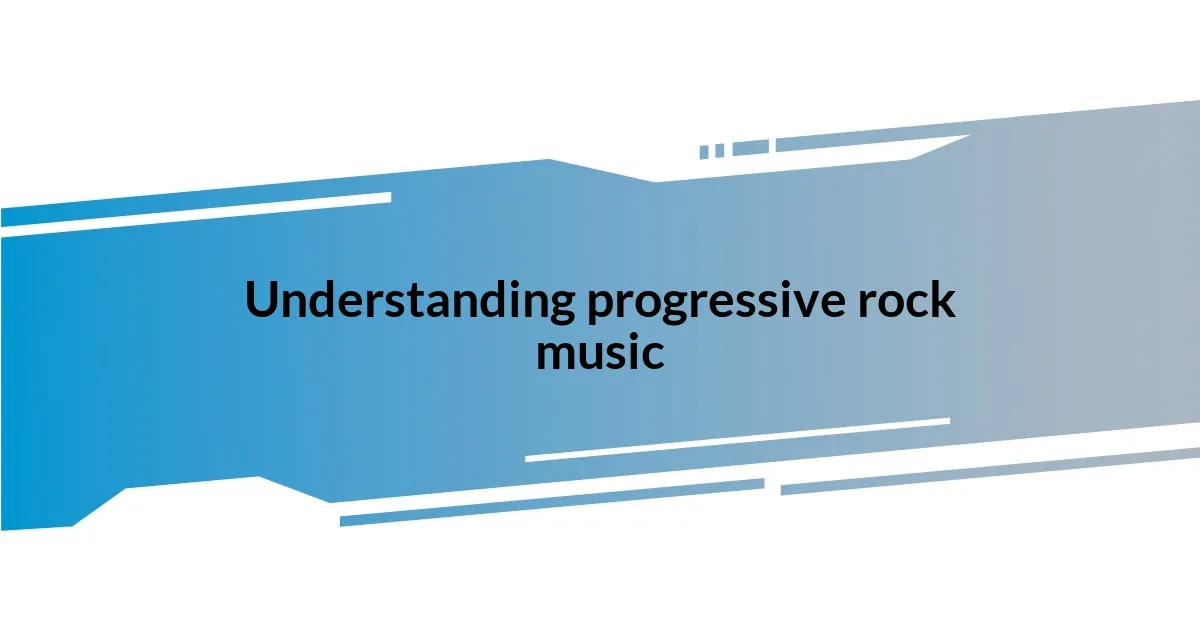
Understanding progressive rock music
Progressive rock, often abbreviated as prog rock, is a genre that pushes the boundaries of traditional rock music. My first encounter with bands like Yes and Genesis felt like stepping into a vivid dream where each song told a complex story, rich with intricate melodies and extended compositions. Isn’t it fascinating how these musicians blend elements from jazz, classical, and even avant-garde styles?
What really sets progressive rock apart is its emphasis on artistic expression and concept-driven albums. I remember listening to Pink Floyd’s “The Dark Side of the Moon” in one sitting, completely entranced by how each track connected to a larger theme of life and mental struggle. It’s as if the music invited me into a space for introspection—who wouldn’t want to explore their feelings through such beautifully crafted soundscapes?
In many ways, progressive rock is like an immersive art form. The elaborate arrangements and thought-provoking lyrics often make me reflect on the world around me. Have you ever found a song that resonates so deeply that it feels like a personal revelation? Whether it’s the ethereal harmonies or the experimental instrumentation, I appreciate how prog rock offers listeners a journey rather than just a collection of songs.
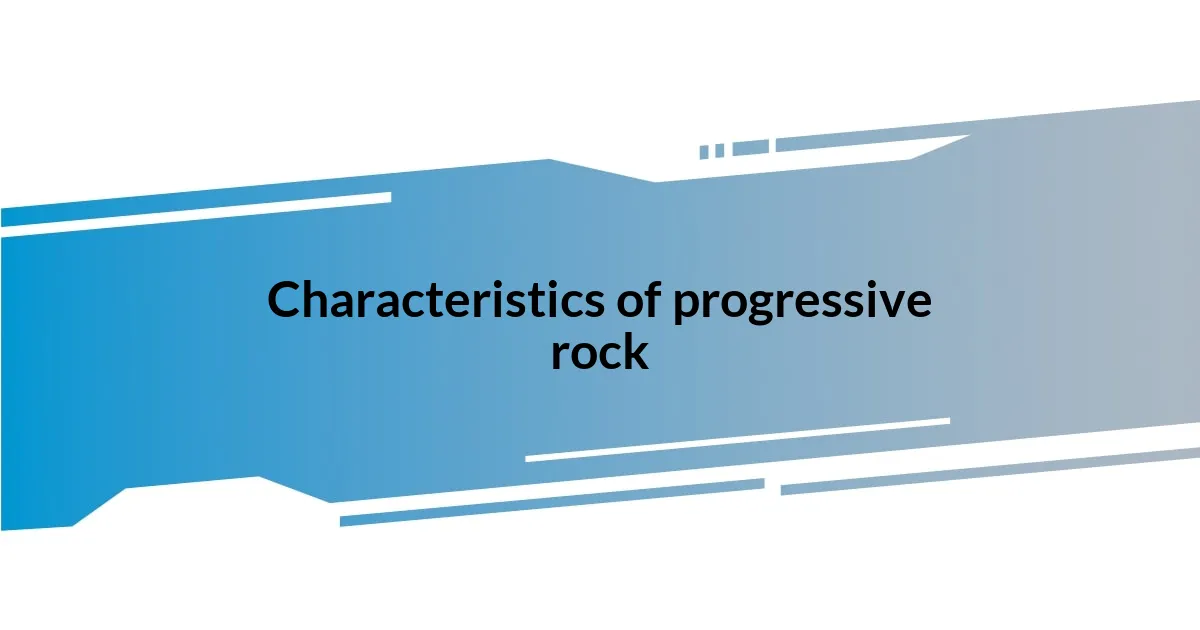
Characteristics of progressive rock
Progressive rock is distinguished by its complex compositions and rich instrumentation, often blending elements from various genres. I remember when I first listened to “Close to the Edge” by Yes; the shifts in tempo and time signatures were mind-bending. It’s a thrilling experience to dive into music that challenges conventional song structures and invites listeners to truly immerse themselves in the art.
Another key characteristic is the lyrical depth often found within progressive rock, which frequently explores philosophical and fantastical themes. Listening to “The Fountain of Salmacis” by Genesis, I was captivated not only by the music but also by how the lyrics transported me into an enchanting mythological tale. It’s almost like reading a novel, where each line unfolds a new layer of meaning and invites reflection.
One aspect I greatly appreciate about progressive rock is its tendency towards concept albums, where the entire record conveys a singular overarching story or theme. I recall playing “The Wall” by Pink Floyd from start to finish, feeling each track build upon the previous one. It’s this cohesive storytelling that links the songs together, elevating the experience into something much more profound than mere listening.
| Characteristic | Description |
|---|---|
| Complex Compositions | Characterized by intricate arrangements and unconventional song structures. |
| Lyrical Depth | Explores profound themes and storytelling, often pulling from mythology and philosophy. |
| Concept Albums | Records that tell a cohesive story, enhancing the listening experience. |
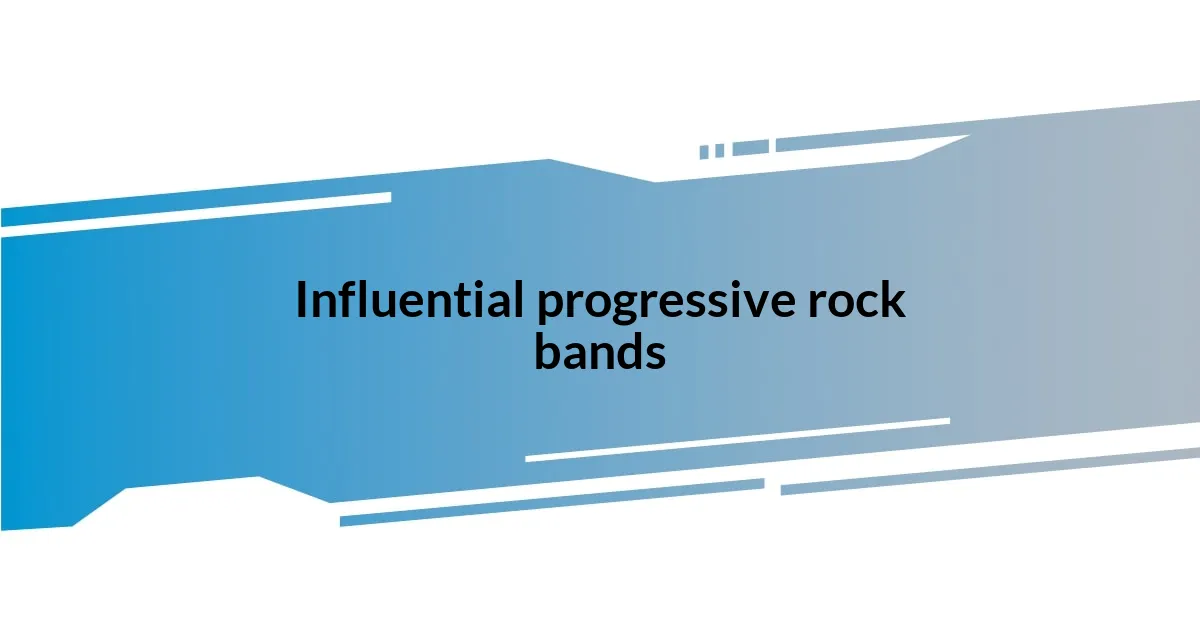
Influential progressive rock bands
Progressive rock has been shaped by several influential bands whose creativity and musicianship paved the way for the genre’s evolution. When I first stumbled upon King Crimson’s “In the Court of the Crimson King,” it felt like encountering a rare gem. The seamless blend of jazz improvisation and haunting melodies captured my attention completely, and I still recall the goosebumps that ran down my arms during the epic “21st Century Schizoid Man.” Their ability to innovate pushed me to explore deeper into the genre and its many facets.
Here are a few bands that have significantly influenced the world of progressive rock:
- Yes: Known for their virtuosic musicianship and complex arrangements, creating timeless classics like “Roundabout.”
- Genesis: Their narrative-driven albums and theatrical performances brought songs like “Supper’s Ready” to life in vivid detail.
- King Crimson: Pioneers of the genre, they introduced darker themes and experimental sounds, particularly with their landmark debut album.
- Pink Floyd: Their atmospheric soundscapes and concept albums, such as “Wish You Were Here,” have left an indelible mark on prog rock.
- ELP (Emerson, Lake & Palmer): Emphasizing classical influences, their powerful live performances are legendary, particularly with pieces like “Karn Evil 9.”
The diverse approaches of these bands shaped my understanding of what music could evoke. Each lyric and melody transported me into different realms, challenging my perceptions and encouraging me to rethink the boundaries of rock.
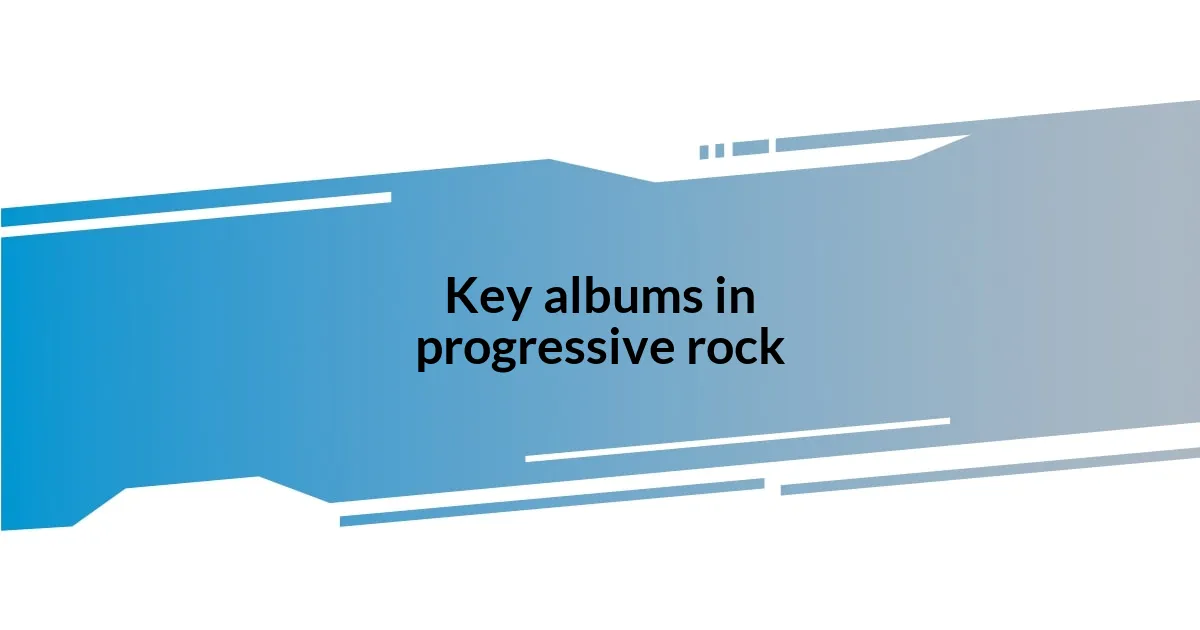
Key albums in progressive rock
When I think about key albums in progressive rock, I can’t help but spotlight “Thick as a Brick” by Jethro Tull. This album stands out to me not just for its single, sprawling track that runs the length of the entire record, but for its satirical take on the concept album itself. The way it weaves intricate musicianship with a playful, tongue-in-cheek narrative is both amusing and profound. Every time I revisit it, I can’t help but grin—it’s a clever commentary wrapped in compelling music.
Then there’s “Aqualung,” which, surprisingly, made a significant impact on my understanding of storytelling through music. The juxtaposition of beautiful, serene sections with more chaotic moments resonates deeply with how life often feels. I remember listening to “Locomotive Breath” while driving through a rainstorm, feeling like I was caught in a surreal narrative. The way the music reflects the lyrics brings everything to life, allowing me to experience each emotion while contemplating its deeper meaning.
And, of course, we must acknowledge “Brain Salad Surgery” by Emerson, Lake & Palmer. The arrangement of “Karn Evil 9” is something I could listen to over and over; its shifting movements create a rollercoaster experience for the listener. I often find myself wondering, how do they manage to blend such varied musical influences seamlessly? Every time I hear it, I’m swept away by the complexity and brilliance—it’s a reminder that progressive rock truly pushes the boundaries of not just music, but also what art can be.
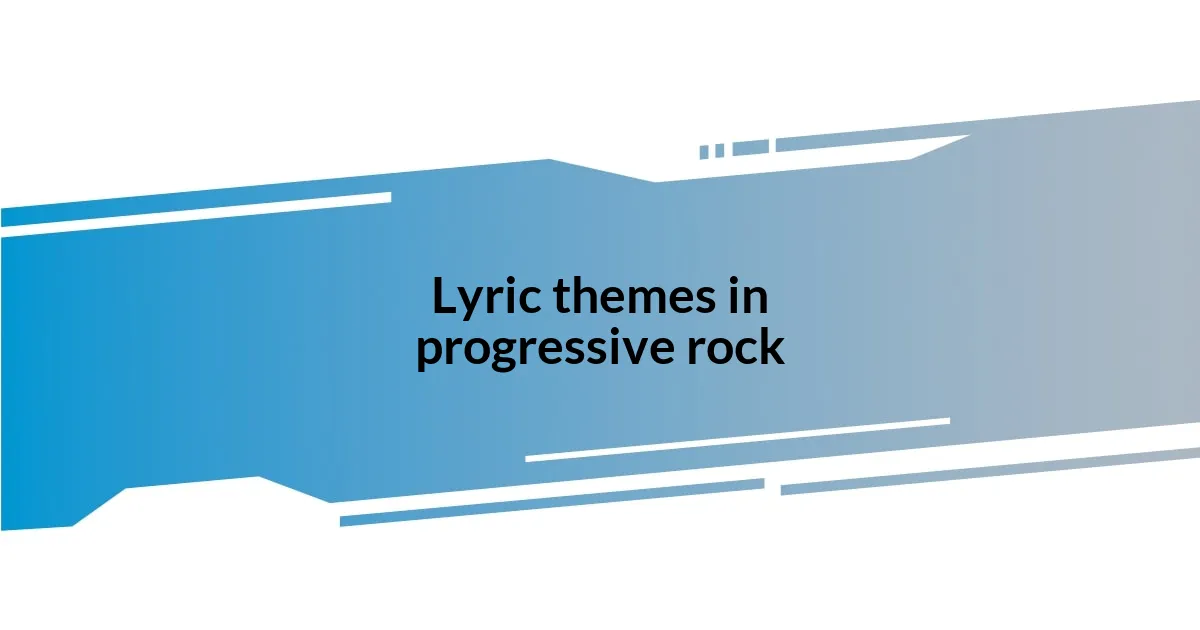
Lyric themes in progressive rock
Lyric themes in progressive rock often dive deep into abstract concepts, alternate realities, and even philosophical musings. I recall listening to “Fool’s Overture” by Supertramp, where the lyrics weave a narrative rich with historical references and introspection. It’s fascinating how a song can transport you into a reflective state, prompting questions about the human experience—how often does music compel us to ponder our place in the universe?
Another intriguing aspect is the use of storytelling in progressive rock lyrics. Take “The Musical Box” by Genesis, for example. The vivid imagery and emotional depth in the storyline evoke memories of childhood innocence and lost love. I find myself reminiscing about my own past, straddling the line between nostalgia and melancholy as the words resonate with my experiences. Have you ever felt such an emotional connection to a song that it becomes part of your personal narrative?
Moreover, progressive rock often grapples with social and political themes, stirring advocacy for change or reflection on societal flaws. Listening to “Animals” by Pink Floyd leaves me contemplating the nature of humanity and capitalism. It’s remarkable how the anger and urgency in the lyrics are mirrored in the music itself, creating an experience that resonates long after the last note. It challenges me to consider not just the lyrics, but how we can respond to these pressing issues in our own lives. In my experience, music holds an incredible power to inspire thought and action. Don’t you find it rewarding when art can push you toward greater awareness?
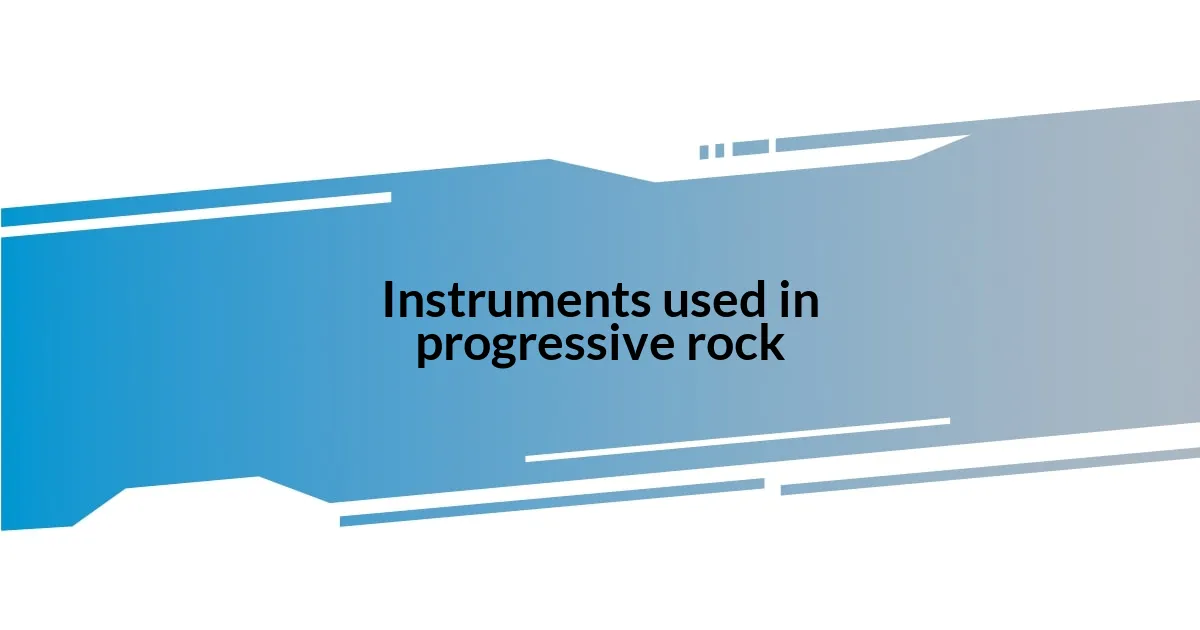
Instruments used in progressive rock
In progressive rock, the instruments used often define the genre’s distinct sound. I remember the first time I heard a Moog synthesizer in a track by Yes. It was like stepping into a futuristic world, where the music seemed to transcend ordinary experiences. The wide array of tones created by these keyboards adds a layer of complexity that draws you in, doesn’t it? It’s amazing how something that originated in the 1960s continues to shape the soundscape today.
Guitarists in progressive rock also often wield a range of effects and techniques that elevate their music. I still get chills when I think about David Gilmour’s guitar solos in Pink Floyd’s “Comfortably Numb.” His use of the slide technique, coupled with atmospheric delays, makes for a sound that evokes profound emotions. Have you ever found yourself lost in a guitar solo that seemed to express everything you couldn’t say? It’s a testament to how crucial instruments can be in forging connections with listeners.
Drums are another essential component in creating the intricate textures characteristic of this genre. The artistry of drummers like Bill Bruford is something I can’t help but admire. I recall a time at a concert where he seamlessly transitioned from complex time signatures to explosive fills, leaving the audience breathless. It makes me ponder—how do these musicians manage to create such cohesion in their seemingly chaotic performances? Their skill not only drives the rhythm but also elevates the emotional intensity of the music, transforming simple beats into a profound experience.
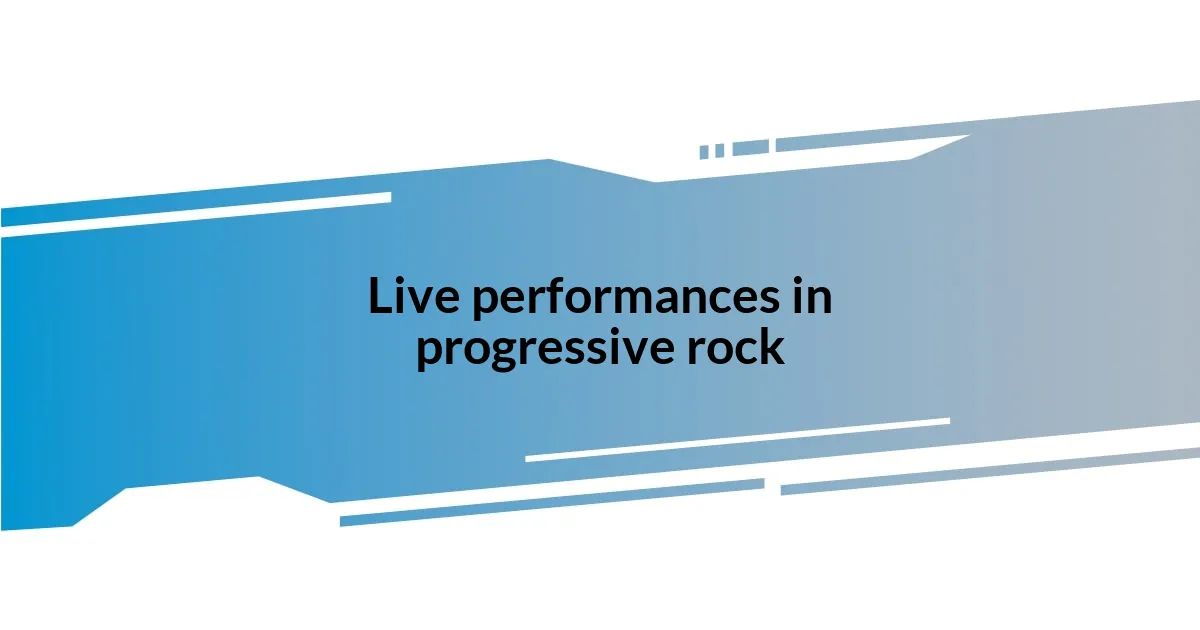
Live performances in progressive rock
Live performances in progressive rock are often as much a visual spectacle as they are an auditory experience. I vividly remember attending a concert where the lighting synchronized perfectly with the intricate rhythms, creating a mesmerizing environment. How often do we find ourselves swept away by not just the music but the energy in the room? It’s electrifying!
The improvisational aspects of live shows bring an element of unpredictability that I truly cherish. I’ve seen bands like King Crimson stretch their compositions into expansive jams that seemed to breathe and evolve in real-time. There’s something special about that moment when the musicians lock into a groove, and you can almost feel the collective heartbeat of the audience. Have you ever found yourself completely lost in a live performance, where time seems to stand still as you’re captivated by the unfolding journey?
Moreover, the storytelling nature of progressive rock is beautifully showcased on stage. During a live rendition of “The Cinema Show” by Genesis, I was astonished by how the musicians transformed a complex tapestry of sound into an engaging narrative that drew me in. It’s fascinating how a single performance can convey such intense emotions and thought-provoking themes, leaving you to reflect long after leaving the venue. Have you ever left a concert feeling like you’ve experienced something truly transformative?